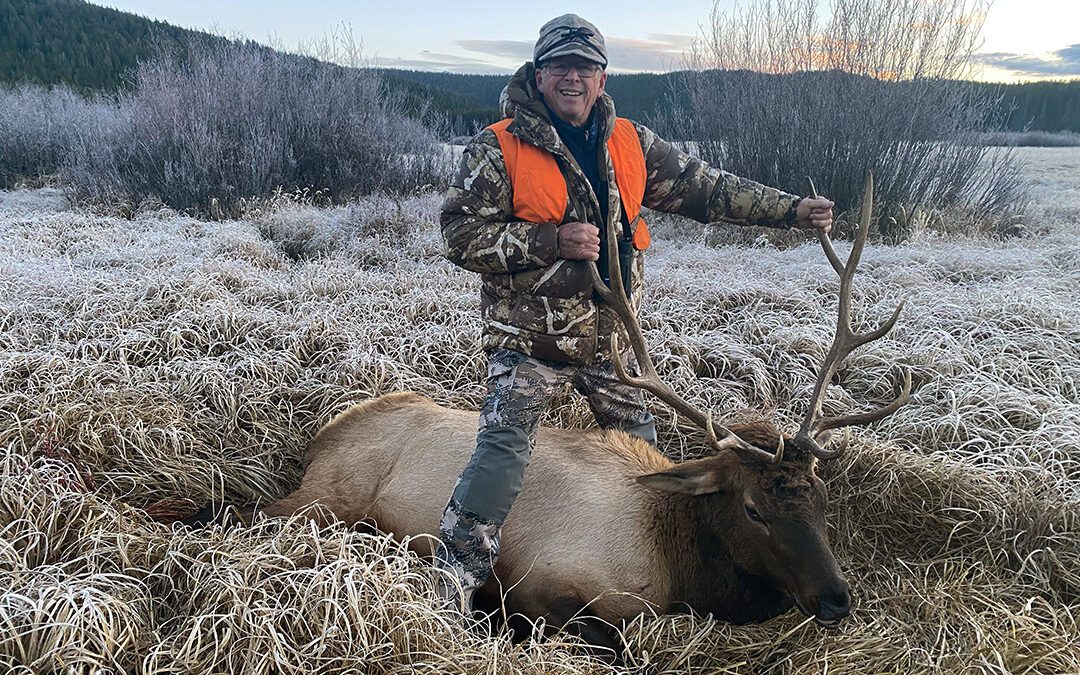There’s lots to do. I open the tent and get a fire going in the wood stove while Rick, my hunting partner, unloads our gear from the truck. After we’ve unpacked everything, and the tent has had time to feel the effects of the stove running wide open, we sit in comfort, enjoying a whiskey to take the edge off our late arrival and make plans for a dawn assault on the local elk population. Once those plans are made, we bank the stove with wood and roll out our sleeping bags. We’d arrived at camp around midnight, not the ideal time to start a short hunt, but unexpected things had happened.
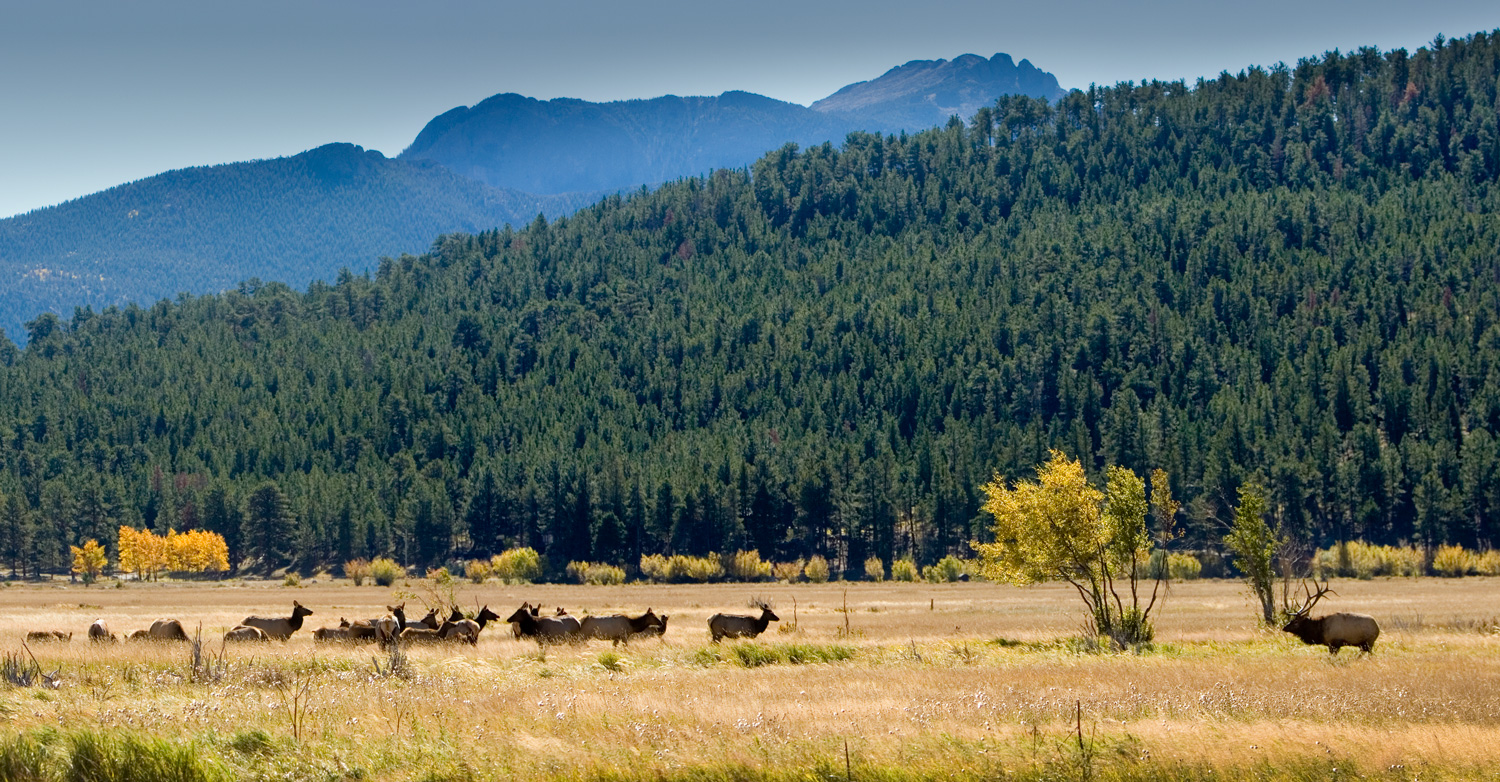
My long day started out at Dallas Fort Worth Airport where my wife Lisa and I had arrived early enough to check our luggage, including my rifle case, and get through security to enjoy a hot breakfast. We were both excited. We were off to Montana, a place we love – a place with many fond memories, including pack trips into the Bob Marshall Wilderness to fish the south fork of the Flathead River, the White River and the high country of the lake plateau.
On this adventure, my good friend Rick Stauffer, who lives in Billings, was scheduled to meet me when I arrived on our early afternoon flight into Bozeman. There, we would load up my gear, then head west, driving three hours to camp. Rick and I have been hunting together off and on since the early ‘90s, mostly for whitetails, quail and waterfowl up and down the Brazos River in West Texas, a beautiful country with high bluffs overlooking wide-open plains. Comanches once roamed and dominated this part of the American frontier. They were referred to as lords of the plains and were feared all the way from northern Mexico to the Dakotas. To get a feel for what this country was like in the old days, I can highly recommend the book, Empire of the Summer Moon, by S.C. Gwynne. But back to DFW.
Lisa and I were able to board the plane and leave on time, but after that, things started to go south. We were cruising at 30,000 feet along with our luggage, enjoying the ride. But somehow, while handling my gun case at the airport, a gremlin had mistakenly diverted it to Las Vegas. Now things began to get complicated.
Hunting elk is tough business, and without my rifle, it would be darn near impossible to drop an animal and hang it from the meatpole. Rick was planning to drive over and pick me up at the Bozeman airport. Fortunately, he had been delayed at work, and I was able to contact him and ask him to bring me one of his spare rifles.
After a short discussion, we decided on his Winchester Model 70 in .30-06. Luckily for me, Lisa, who had stayed in Bozeman because of work commitments, was finally able to retrieve my rifle safe and sound from the airline. God, I love that woman. Now back to elk camp.
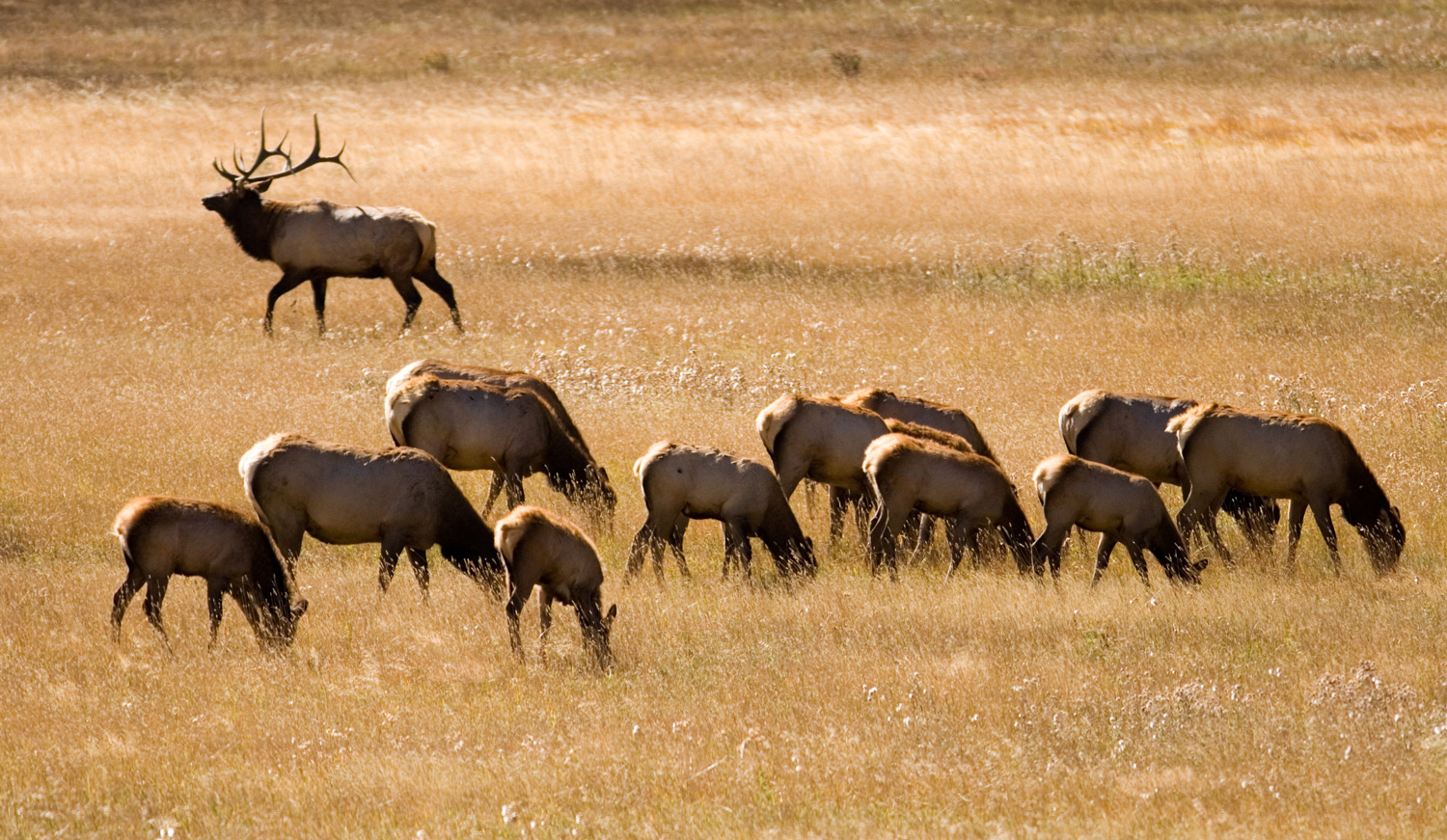
Seemed like I had just closed my eyes when the alarm went off. We crawled out of our sleeping bags into a cold tent. I got busy loading the stove with wood and nursing it back to life with the help of a little kerosene, so we would have heat in our tent. Rick was busy getting a pot of coffee going on our small camp stove. Soon we were dressed, enjoying a hot cup of joe and a bite to eat. But now it was time to give up our warm tent and start hunting. We grabbed our rifles and packs, stepped out into a cold Montana morning and opening day of the elk season. Our game plan was to drive 40 miles to a trailhead and hike a couple of miles into the national forest to a favorite spot where we’d gotten into elk in years past.
The reason why there’s almost always elk there is because it’s a miserable place to hunt. Located on a mountain-top that had been burned years ago, what’s left is a jungle of dead and downed timber. You’re constantly walking or crawling over and around deadfalls.
When I last hunted the area a couple of years ago, I almost got a shot at a nice bull. I was putting a sneak on him when the thought crossed my mind: Are you really going to kill this bull in this God-awful place and spend two days packing out elk quarters? But the answer was obvious, Yep. I’m gonna do it if I get a good shot. But it didn’t happen. The wind did a 180, and suddenly I felt it on the back of my neck. The whole mountain-top blew up, and the bull, along with his girlfriends, left the country at light speed. As I was standing there, the question crossed my mind as to why packing out elk quarters from a place like this would be fun. Better put myself in for a psyche evaluation when I get home, I thought.
After leaving the trailhead, part of our overall plan was to arrive at a natural spring at daylight. It was about a mile away, in a place where we’d gotten into elk in past seasons. We got there at daylight as planned, but much to our surprise, we discovered that a group of ambitious young hunters had set up a spike camp at the spring, right in the middle of our prime hunting area. With no choice in the matter, we pushed on another half-mile, where we saw several more hunters and finally three cow elk. Disappointed, we gave up the idea of hunting any farther in, and hunted our way back to the trailhead, climbed into our truck and headed back to camp.
For our last day of hunting, we decided to head over to a large open park surrounded by national forest about a half-mile above camp. The area had produced elk before. We’d arrive at daylight and hope to get lucky. That evening, we heated up our dinner on the wood stove, had a whiskey, cursed our bad luck of the day and turned out the light.
The next day, we were up before daylight. Same routine: stoke the stove, make hot coffee and enjoy a bite to eat. We shouldered our packs and headed for the park, arriving just at daylight. Rick hiked off into the timber on the right and I veered off to the left.
I had only gone a couple hundred yards when all hell broke loose. About a half-mile above me, there was a big clear-cut where a group of hunters had gotten into some elk. My hope was that while making their getaway, the animals would come down off the mountain and cross into the open park. I headed for the edge of the trees at a run. Just as I got there and set up for a shot, I could hear the elk coming down through the timber. I took off my gloves and braced my frame against a lone aspen. Within a minute, six cows broke out of the timber about 85 yards away, quickly followed by a nice five-by-five bull and two more cows.
The bull saw me, did a 180 and kicked it into high gear, running straight away. Now I was in a fix. I didn’t know if he would cut back into the timber or keep going, hellbent for leather away from me. Knowing full well I was going to catch a lot of grief from Rick if I passed up the shot, I decided I better get a bullet somewhere into this bull to slow him down. So, I gave him the old Texas heart-shot into his right hindquarter. That turned him around, and with one more 180-grainer through the shoulders, the ‘06 had worked its magic. The bull was down.
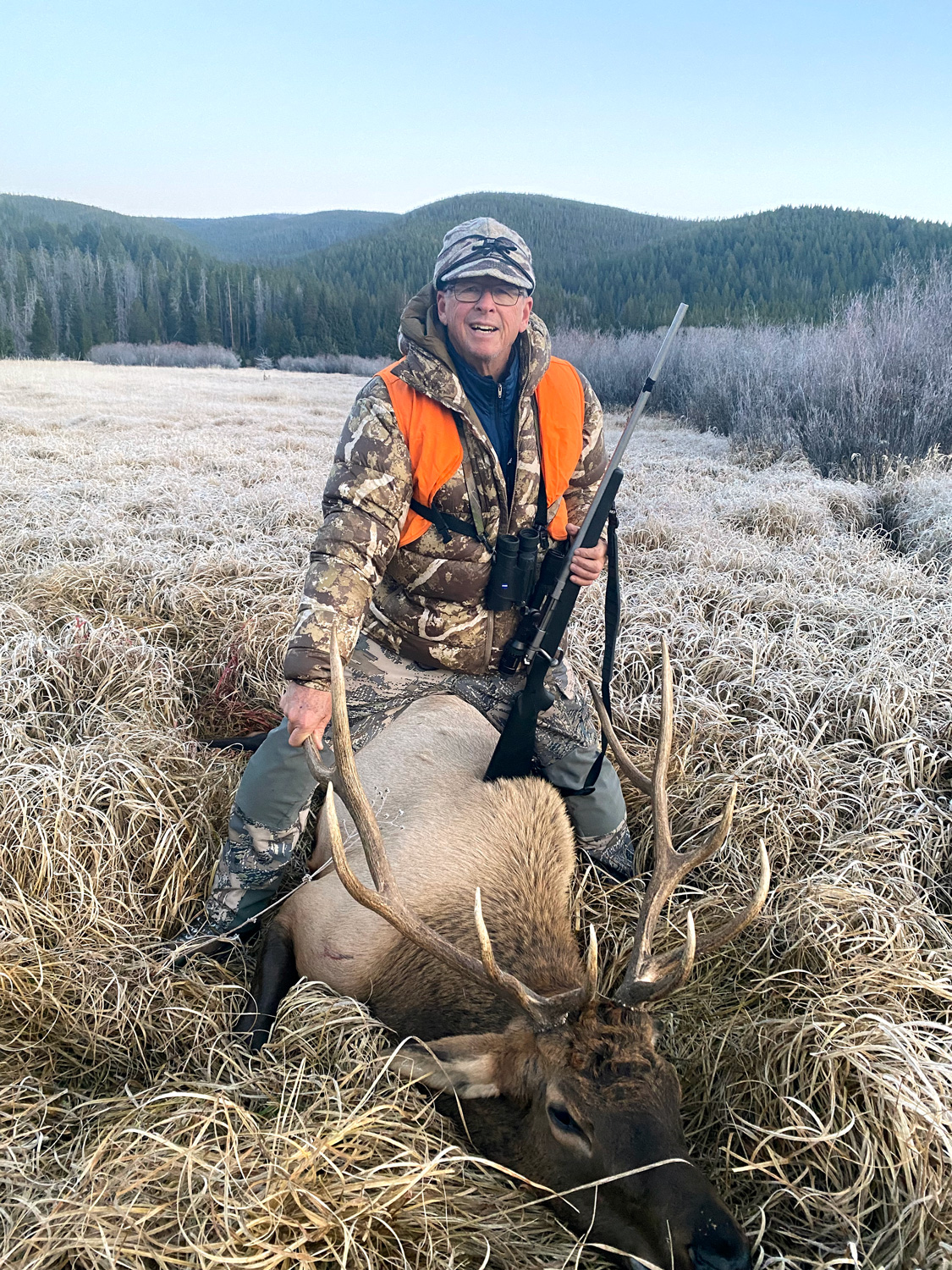
My! The elk gods and some unknown hunters had been kind to me. Rick and I congratulated each other, took a ton of pictures and started to break down the awesome bull.
I started the skinning process while Rick headed back to camp to get the pack boards and game bags. And when he returned, he took over the skinning and quartering with the skill of a heart surgeon. Three hours later, we had cut up the bull, packed the quarters back to camp and had them hanging from the meatpole. Still not believing what had just happened and how quickly things had changed, we pulled up a camp chair, cracked open a beer and talked about how well the elk gods had treated us that morning. But then came the part I don’t like: leaving camp.
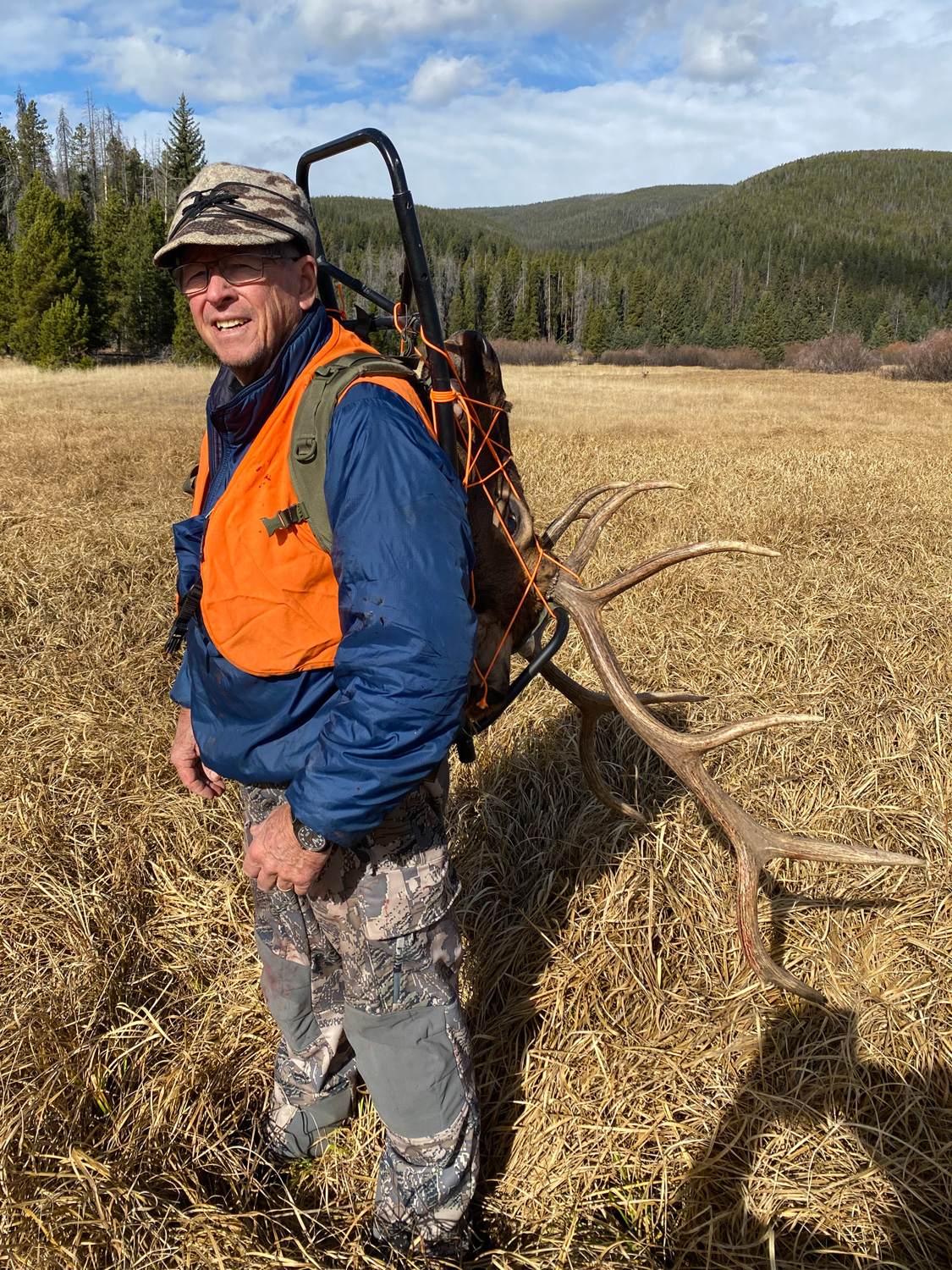
I think I can speak for myself and other hunters. Whether it’s a wall tent in the mountains of Montana or a rundown wood shanty in West Texas, a hunting camp is a place that just makes us feel good. Worries, aches and pains disappear, and this chaotic world we live in seems to fade away. Now it was time for one last look at the tent sitting in bright sunlight and to burn that image into my long-term memory, along with other hunting camps I’ve enjoyed, then load up to depart, only for now, this last great place called Montana.

